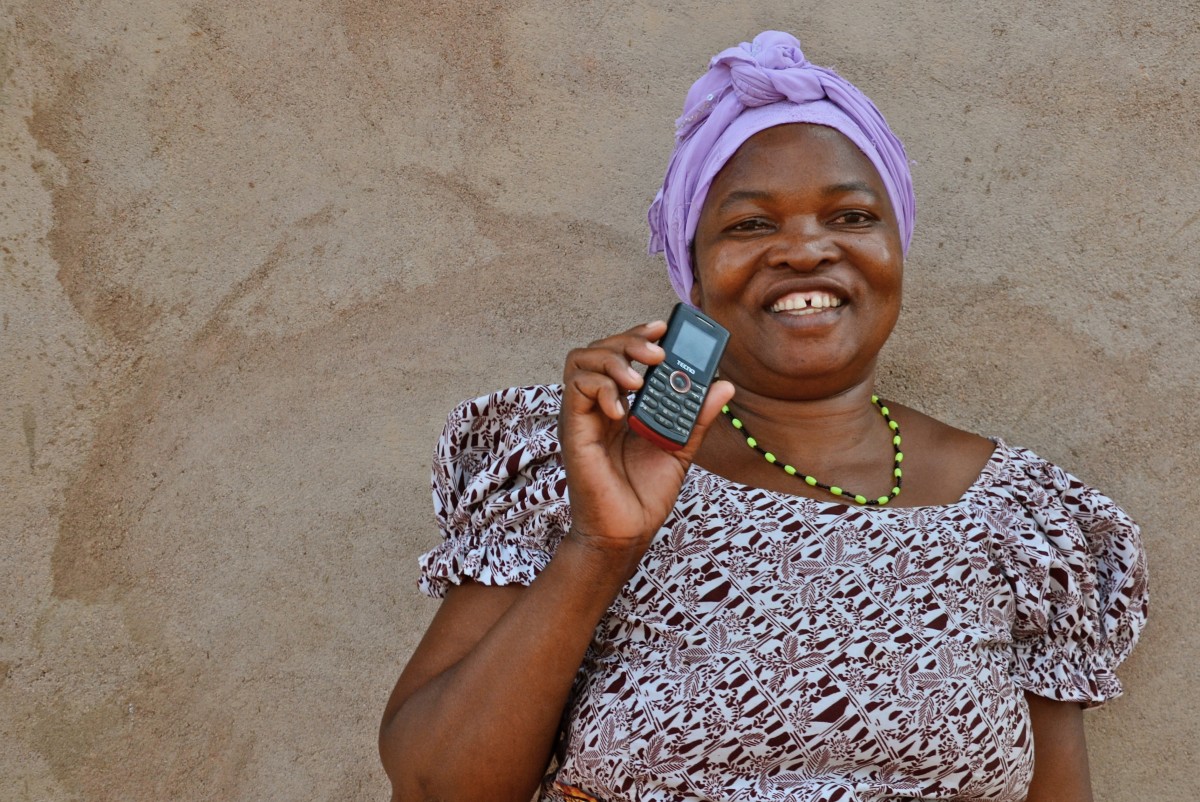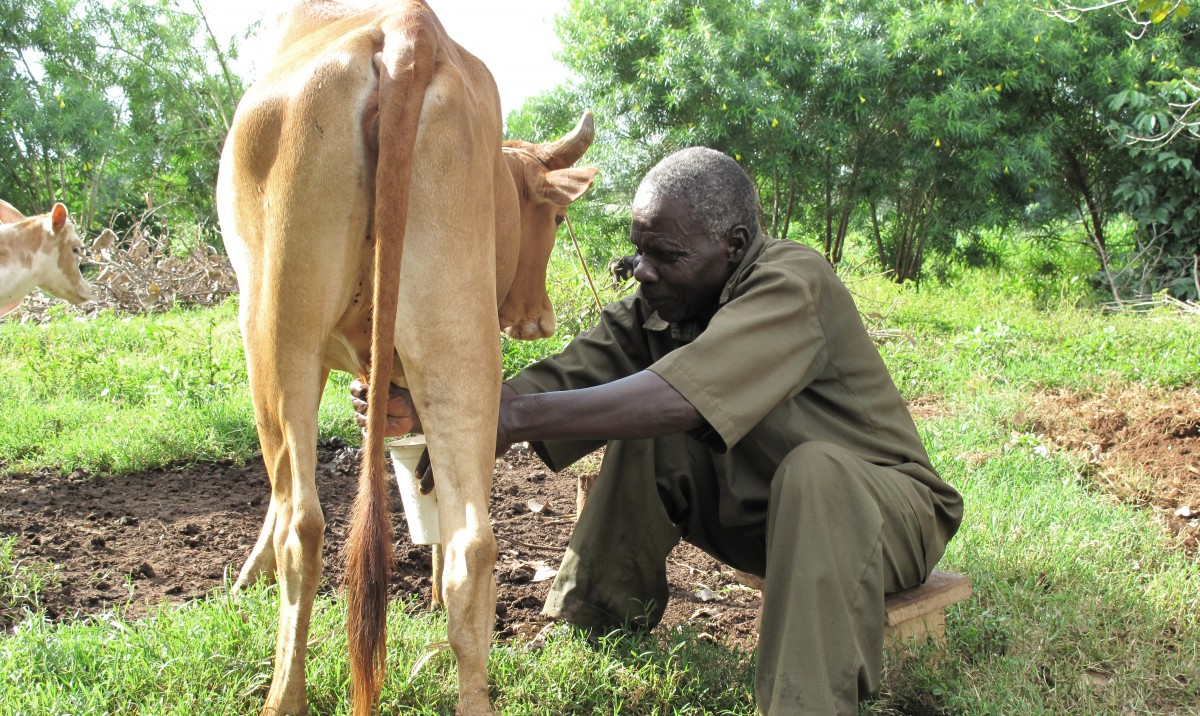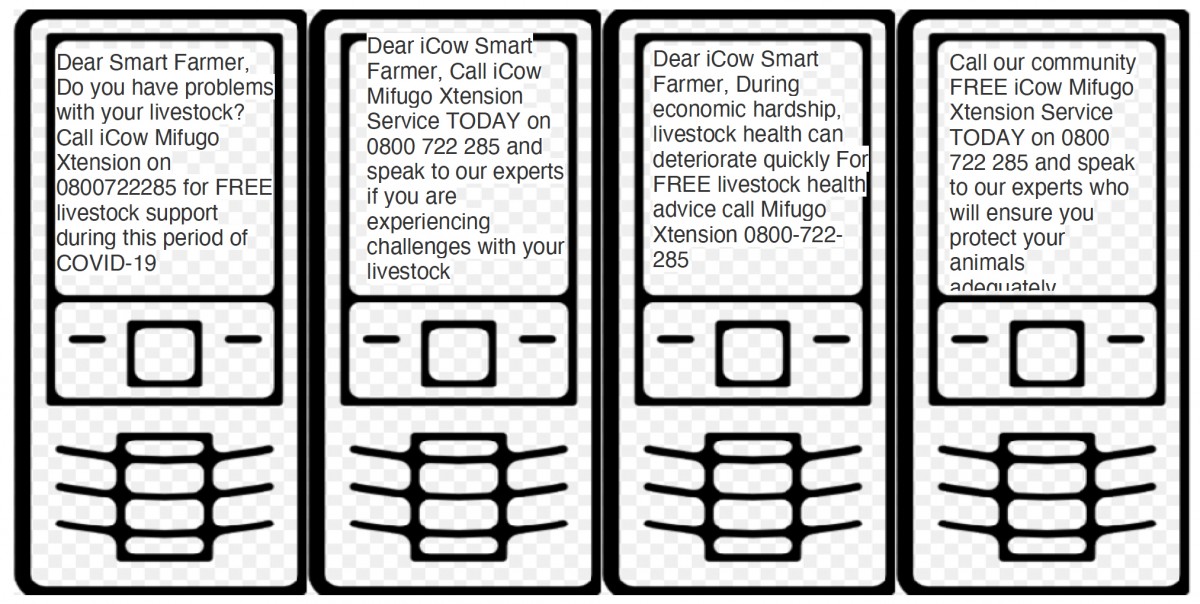
The future of agricultural extension in Africa is digital
It’s July 2020 and Catherine Mwangangi’s cow is sick – rough looking skin, feeding issues and challenges walking. Worried, she calls a vet who treats the cow for a tick borne disease, but it doesn’t seem to be getting better. An SMS comes through on her phone: “Dear Smart Farmer, Do you have problems with your livestock? Call iCow Mifugo Xtension for FREE livestock support during this period of COVID-19.”
Curious to see what advice she would get, Catherine calls the helpline number. A volunteer animal husbandry and health specialist answers and, after some discussion, advises her to contact her vet again, as the cow seems to be suffering signs of anaemia and skin mites. The volunteer also gives her some information to improve her livestock feeding regime and advises her to also ask the vet for a treatment to improve the cow’s appetite. Catherine thanks them for their help.
For farmers in East Africa, particularly those in hard-to-reach rural areas, conversations such as these that provide quality farming advice and information in an instant is a lifeline.
“Livestock extension services are already scant on the ground and expensive for most small holder farmers in Kenya. This technology and platform provides needy farmers with free instant vital assistance,” says Su Kahumbu, Creative Director of Green Dreams Tech Limited, which is the tech firm behind the agricultural IT platform iCow.
The iCow Mifugo Xtension is part of a suite of digital services being provided to livestock farmers in East Africa as part of iCow’s partnership with the African Dairy Genetics Gains program (ADGG).
The data from Catherine’s conversation – her location, her gender, her cow’s issues, the recommended treatments, and more - is logged by the volunteer animal husbandry and health specialist into an app on their phone. It is instantly analysed and, along with the data from hundreds of other farmer helpline calls, are displayed on an easy-to-read dashboard.
“Through this platform, we’re enabling policy makers to get a clearer picture of the actual livestock problems happening on the ground, which will hopefully help ensure government agricultural policies are aligned with farmer priorities,” says Okeyo Mwai, principal scientist at the International Livestock Research Institute and leader of ADGG.
 Livestock extension services are already scant on the ground and expensive for most small holder farmers in East Africa. Making these services available digitally provides needy farmers with free instant vital assistance. Photo C. Schubert/CCAFS
Livestock extension services are already scant on the ground and expensive for most small holder farmers in East Africa. Making these services available digitally provides needy farmers with free instant vital assistance. Photo C. Schubert/CCAFS
Phone as a tool
Current agricultural extension services rely on face-to-face interactions between extension agents and farmers. But because of inadequate human and financial resources it’s not a practical way to deliver advice to farmers in very remote areas, or at scale.
“There are over a 400,000 small-scale dairy farmers in Kenya alone,” says Okeyo. “Reaching them all to give them information physically would require a huge investment of resources.”
But one thing most farmers do have is a mobile phone. And when Kahumbu, who is herself a farmer, realised that a phone could be used as a tool to connect farmers with agricultural knowledge, she knew she was onto something.
“I won the first Apps for Africa competition with a product called iCow which, at that time, was built to help farmers track the fertility cycle of their cows. But I had a bigger vision that the platform could be used to provide specific agricultural information to farmers on a whole variety of topics,” she says.
iCow started as a voice-based application and as the technology evolved, became an SMS (text messaging service). The reason being that the majority of farmers don’t use smartphones and that SMS has higher retention and sharing capabilities.
“In most of the farming community, the smartphone is a really special thing that you put away and use only when necessary. They are very fragile, need to be frequently charged, and it costs a lot to access the Internet,” Kahumbu says.
“Farmers use phones that are robust and the battery lasts 3-4 days or more. And if nobody builds apps in the SMS space, which is the easiest way to get information to these phones, then the so-called digital divide is just becoming a crevasse. Billions of people are going to be left behind.”
As iCow cornered its target market of farmers over 45 years old, ADGG was planning its activities to help dairy farmers improve the performance of their cows by capturing their data, then undertaking genomic analysis to evaluate and select the best performing bulls and cows to breed better animals.
Given that livestock genetic improvement takes many years to fully see results, they wanted to create instant value for the participating farmers. So they approached Kahumbu to bring on board iCow as a partner.
“We didn’t want to reinvent the wheel. So we chose to work with iCow to refine and interface their platform with ADGG to immediately address dairy issues,” Okeyo says.
 For farmers in East Africa, particularly those in hard-to-reach rural areas, digital services such as iCow that provide instant quality farming advice and information is a lifeline. Photo C. Pye-Smith/ILRI
For farmers in East Africa, particularly those in hard-to-reach rural areas, digital services such as iCow that provide instant quality farming advice and information is a lifeline. Photo C. Pye-Smith/ILRI
So when farmers signed up to participate in ADGG, they were immediately given access to iCow, which provided them with tailored SMS messages on herd and feed management in their national languages and local dialects.
“Farmers in Kenya dial in a short code, they get a menu, and then they choose what they want from that menu. We’ve designed the content based on years of collecting data from farmers about what they want to learn about, so there’s content on everything from farmer health to indigenous crops,” Kahumbu says.
Kenyan farmers can sign up to have the information drip-fed to them over a period of time, or to receive it all in one hit.
“The information is coded so they can form their own archive journals on their farms…some even actually go to the extent of routinely photocopying the pages that they’ve written and share them with their friends.” Kahumbu says.
The model works slightly differently in Tanzania and Ethiopia, where farmers participating in ADGG receive three text messages a week with information on best dairy practices.
The platform also has a variety of tools – farmers can use a location-based search to find out what the soils are like in their area, get customised information about the specific pests in their area, or the best crops to plant based on their agro-ecological zone.
“So when they go to agro dealers, they are much better informed, knowing what varieties they can choose from, so they don’t make the mistake of growing the wrong crop in the wrong area,” Kahumbu says.
iCow has been a hit with the farmers participating in ADGG. After adopting better husbandry and cattle feeding practices from what he’s learnt through his phone, dairy farmer Lukas Mwakalibwa has seen his cows produce up to 60% more milk.
“After training and using the messaging system taught by ADGG I have seen big changes. Before milking, I have been taught that I should make sure the cowshed is clean and use warm water to wash the cows’ udders. My cattle have really changed. They now produce lots more milk. I am grateful for this service,” he says.
As farmers’ cows begin to perform better, the ADGG research team also noticed a renewed sense of pride in farmers, leading to more frequent peer to peer learning.
“Farmer to farmer sharing of information works really effectively, sometimes a lot more effectively than using extension officers. The farmers who have got good yields are proud of what they’re doing and they speak the same language as the farmers in their village,” says John Gibson, Director of the Centre for Genetic Analysis and applications at the University of New England, who collaborates with Okeyo on the ADGG.
Technological solutions in times of crisis
The past few months have been particularly challenging for livestock farmers, with the COVID-19 pandemic wreaking havoc on many rural communities.
“Many small holder farming families include one member of the family who seeks employment off farm. With restrictions, curfews, closure of schools and businesses due to regulations around managing the spread of COVID-19, farming families are pressured with increased consumption in the homes and reduced revenues and they are backsliding into economic hardship,” Kahumbu says.
“As a livestock farmer there are certain practices that you must do on a weekly basis otherwise the incidence of disease will increase. If you don’t have money for treatments, for vaccinations, then the situation becomes quite dire.”
iCow’s Mifugo Xtension – a toll-free hotline - was developed to give farmers a lifeline during the COVID-19 crisis. Not only has it enabled rapid diagnosis of the challenges facing livestock farmers during COVID-19 so they can quickly receive the help they need, it’s also piloting the digital infrastructure necessary to enable governments to design better crisis assistance packages that truly meet the needs of farmers.
 Examples of SMS messages disseminated to farmers informing them about the Mifugo Xtension Service. Photo iCow
Examples of SMS messages disseminated to farmers informing them about the Mifugo Xtension Service. Photo iCow
“We are starting to receive data that will help us look at the agricultural stimulus packages that are being put out by governments to determine to what extent they are aligned with the actual priorities on the ground,” Kahumbu says.
“We hope the data from this program will convince governments of the importance of investing in technological solutions to agricultural extension.”
With over 78,000 farmers now participating in ADGG from Tanzania and Ethiopia, the program has its sights on expansion to Kenya, Uganda and Rwanda.
“The platform is open to all farmers. We want to ensure that no Eastern African livestock farmer is left behind,” Okeyo says.





